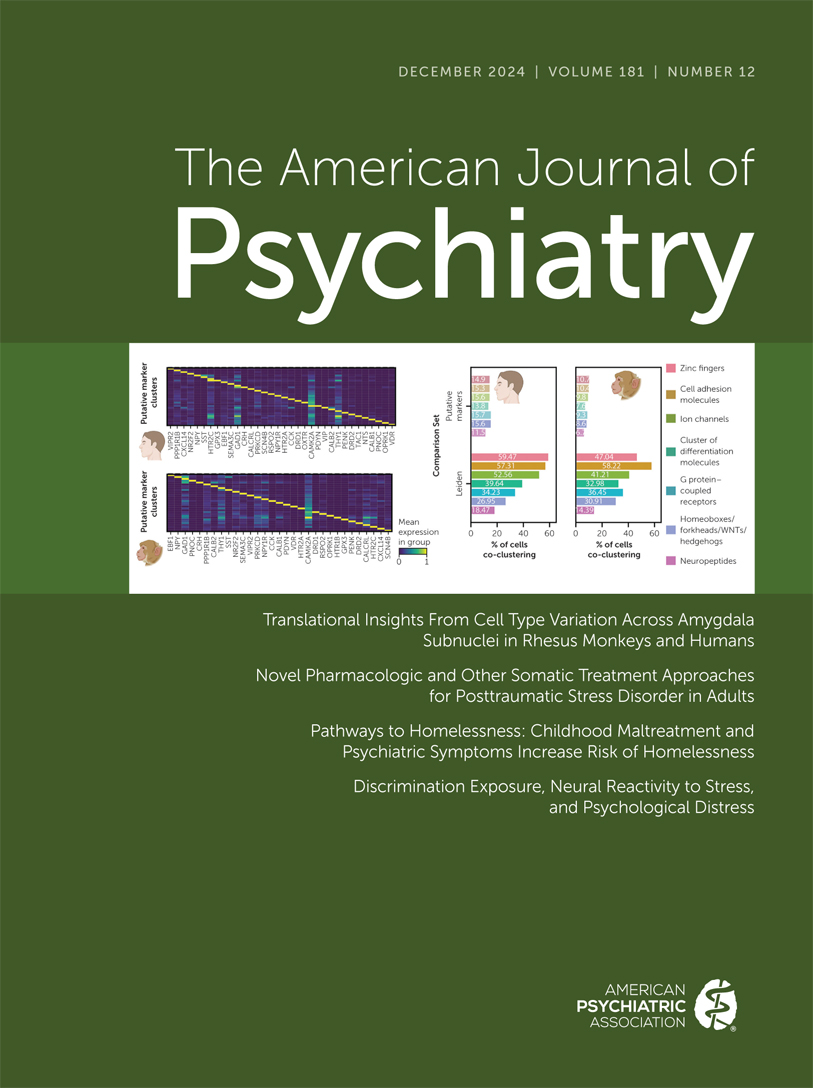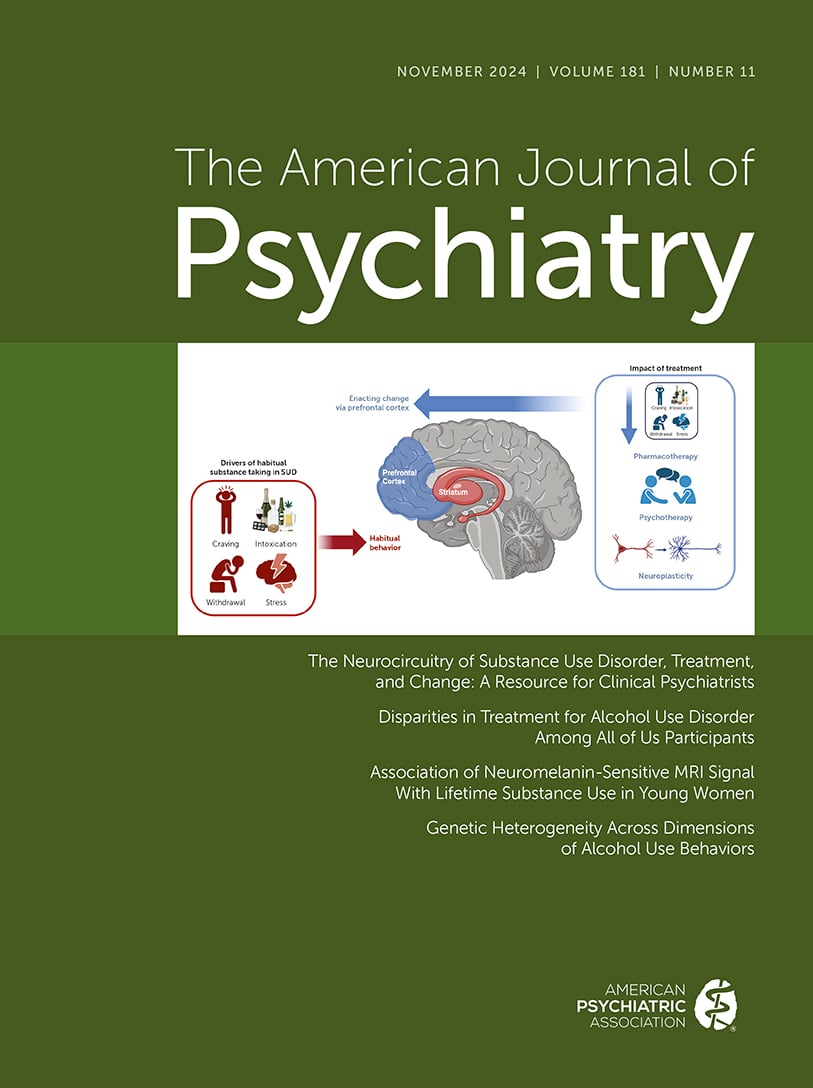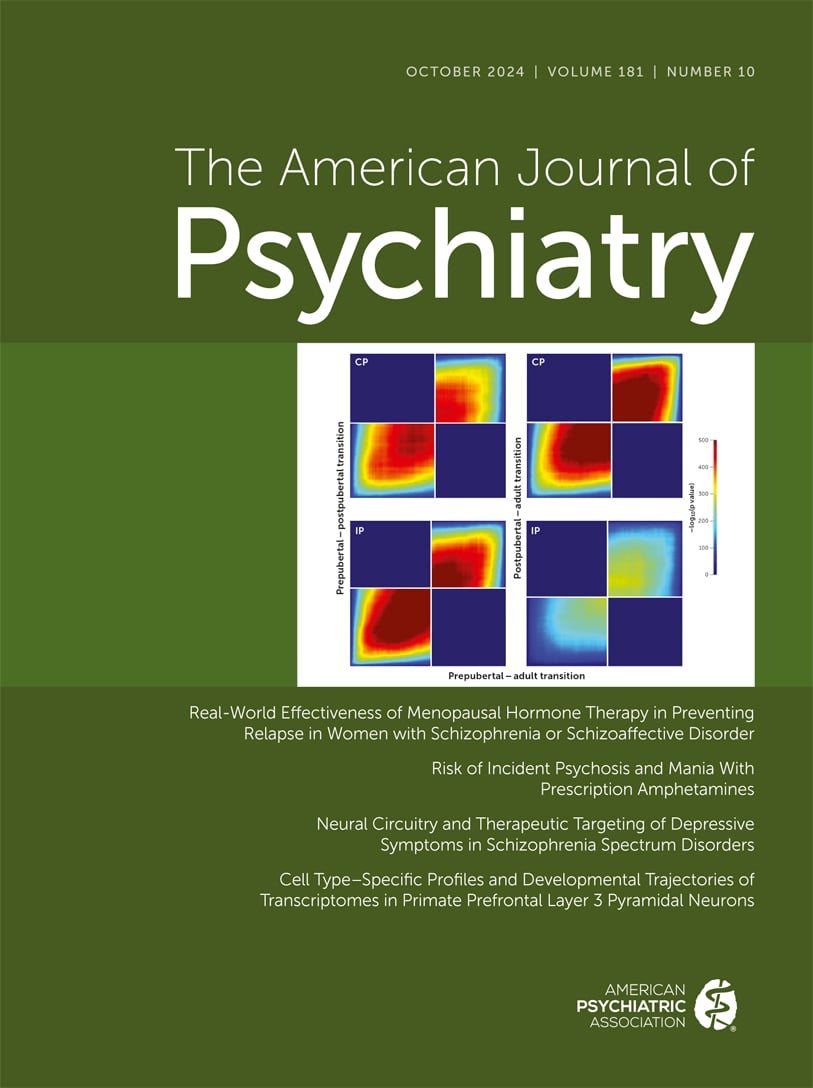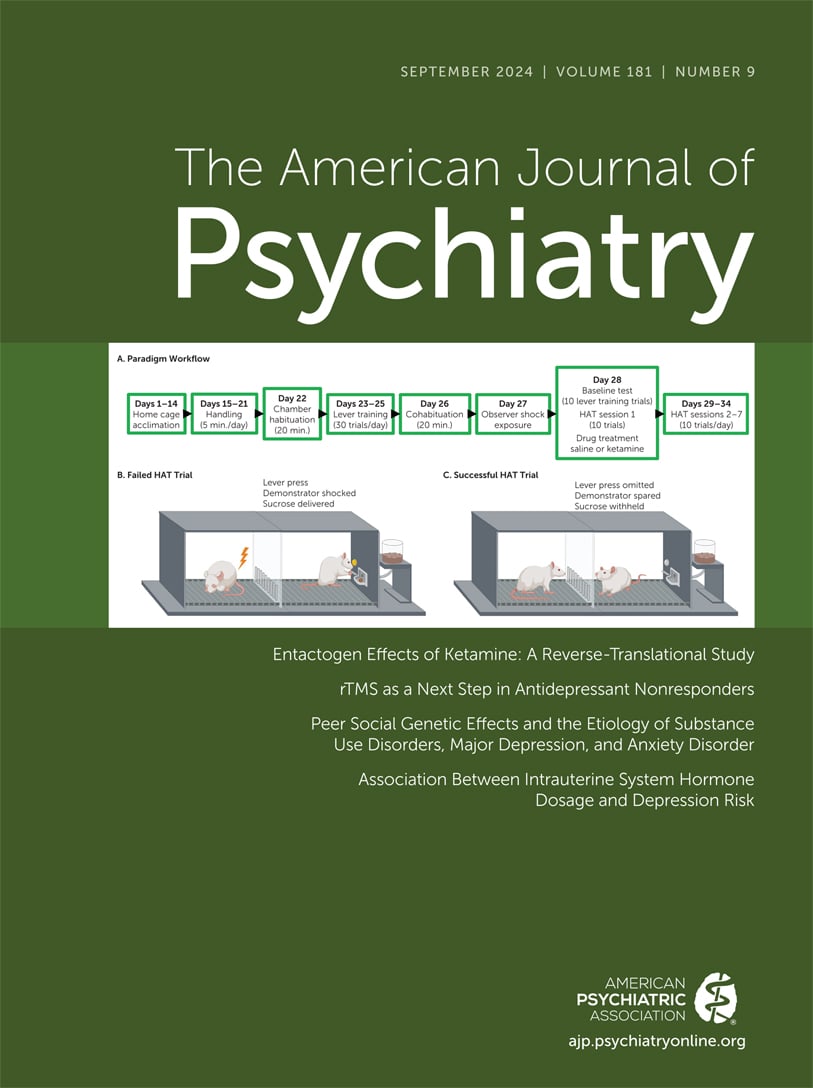American Journal of Psychiatry
- Volume 152
- Number 2
- February 1995
Article
Publication date: 01 February 1995
Pages164–172OBJECTIVE: Over the past 3 years, reports of DNA alteration in myotonic dystrophy, fragile X syndrome (types A and E), Kennedy's disease, Huntington's disease, spinocerebellar ataxia type 1, and dentatorubral- pallidoluysian atrophy have identified a new ...
https://doi.org/10.1176/ajp.152.2.164Publication date: 01 February 1995
Pages173–178OBJECTIVE: The aim of this study was to examine the relationships among clinical effects, central D2 dopamine receptor occupancy, and plasma concentrations of haloperidol in eight clinically stabilized schizophrenic outpatients who were responding to ...
https://doi.org/10.1176/ajp.152.2.173Publication date: 01 February 1995
Pages179–182OBJECTIVE: The purpose of this study was to determine if plasma clozapine levels were associated with treatment response. METHOD: To examine this question, neuroleptic nonresponsive patients with schizophrenia or schizoaffective disorder were given ...
https://doi.org/10.1176/ajp.152.2.179Publication date: 01 February 1995
Pages183–190OBJECTIVE: Suicide has been reported to occur in 9%-13% of schizophrenic patients. It has been suggested that neuroleptic- resistant or neuroleptic-intolerant schizophrenic patients are at higher risk for suicide than neuroleptic-responsive patients. ...
https://doi.org/10.1176/ajp.152.2.183Publication date: 01 February 1995
Pages191–196OBJECTIVE: The goal of this study was to assess neurological soft signs and developmental reflexes in schizophrenic patients who had never received neuroleptic medication and those who were receiving neuroleptic medication. METHOD: Neurological soft signs ...
https://doi.org/10.1176/ajp.152.2.191Publication date: 01 February 1995
Pages197–207OBJECTIVE: The goal of this study was to characterize the symptoms of geriatric, chronically ill, institutionalized schizophrenic patients and investigate age-related differences in schizophrenic symptoms and cognitive performance from early adulthood to ...
https://doi.org/10.1176/ajp.152.2.197Publication date: 01 February 1995
Pages208–212OBJECTIVE: The 1-year prevalence of schizophrenia was studied in a limited geographical area of Reunion Island (Indian Ocean) to assess the impact of family history of schizophrenia on the well-known association between gender and age at onset. METHOD: ...
https://doi.org/10.1176/ajp.152.2.208Publication date: 01 February 1995
Pages213–219OBJECTIVE: The multiple disorders of selective attention found in schizophrenia could be secondary to disturbances in sensory processing. The authors investigated this possibility by using an event-related potential index of auditory sensory memory, ...
https://doi.org/10.1176/ajp.152.2.213Publication date: 01 February 1995
Pages220–223OBJECTIVE: Very few studies have quantified the level of agreement among alternative diagnostic procedures that use a common set of fixed operational criteria. The authors examined the procedural validity of four independent methods of assigning DSM-III-R ...
https://doi.org/10.1176/ajp.152.2.220Publication date: 01 February 1995
Pages224–231OBJECTIVE: This study sought to elucidate the relation of clinical, neuropsychological, and seizure variables to chronic and postictal psychoses in patients with temporal lobe epilepsy. METHOD: Forty-four patients with treatment-refractory temporal lobe ...
https://doi.org/10.1176/ajp.152.2.224Publication date: 01 February 1995
Pages232–238OBJECTIVE: To examine the effect of hypomanic states on maladaptive personality traits and personality disorders, the authors evaluated personality traits and disorders of patients during an episode of hypomania and after successful somatic treatment. ...
https://doi.org/10.1176/ajp.152.2.232Publication date: 01 February 1995
Pages239–247OBJECTIVE: Dysthymia is generally believed to be associated with a high rate of DSM-III-R axis II comorbidity. However, it is unclear whether this rate is higher than that for other axis I disorders, how many dysthymic patients have personality disorders, ...
https://doi.org/10.1176/ajp.152.2.239Publication date: 01 February 1995
Pages248–252OBJECTIVE: The authors investigated the metabolic maturation of the frontal cortex in pre-school autistic children. METHOD: Regional cerebral blood flow (CBF) in five children with primary autism diagnosed according to the DSM-III-R criteria was studied ...
https://doi.org/10.1176/ajp.152.2.248Publication date: 01 February 1995
Pages253–257OBJECTIVE: This study investigated types of change that occur over time in the psychopathology of narcissistic patients. METHOD: Baseline scores on the Diagnostic Interview for Narcissism of 20 patients, clinically diagnosed as having narcissistic ...
https://doi.org/10.1176/ajp.152.2.253Publication date: 01 February 1995
Pages258–263OBJECTIVE: The purpose of this study was to compare certain demographic and clinical variables in a group of obsessional followers and in a group of offenders with mental disorders. METHOD: A static group design comprised of a nonrandom group of ...
https://doi.org/10.1176/ajp.152.2.258Article
Dexamethasone for the treatment of depression: a randomized, placebo- controlled, double-blind trial
Publication date: 01 February 1995
Pages265–267OBJECTIVE: The authors' goal was to assess dexamethasone for the treatment of depression. METHOD: Thirty-seven outpatients (11 men and 26 women) meeting DSM-III-R criteria for major depressive disorder were randomly assigned to receive either placebo or 4 ...
https://doi.org/10.1176/ajp.152.2.265Publication date: 01 February 1995
Pages268–270OBJECTIVE: Shared symptoms between borderline personality disorder and depression have resulted in inherent difficulties in evaluating the relationship between these disorders. Some theorists have argued that depression in patients with borderline ...
https://doi.org/10.1176/ajp.152.2.268Publication date: 01 February 1995
Pages271–273OBJECTIVE: The purpose of this study was to examine the rate of attention deficit hyperactivity disorder in adolescents with bipolar disorder and to explore the potential effects of comorbid attention deficit hyperactivity disorder on the phenomenology of ...
https://doi.org/10.1176/ajp.152.2.271Publication date: 01 February 1995
Pages274–276OBJECTIVE: The authors compared the effects of bupropion, fluoxetine, and cognitive behavior therapy on EEG sleep in depressed subjects. METHOD: All-night sleep EEG studies were performed before treatment and after partial or full remission on 18 men with ...
https://doi.org/10.1176/ajp.152.2.274Publication date: 01 February 1995
Pages277–279OBJECTIVE: The authors used the family study method to test the hypothesis that sodium lactate response defines two subtypes of panic disorder. METHOD: Rates of panic disorder in 142 first-degree relatives of patients who responded to sodium lactate, 88 ...
https://doi.org/10.1176/ajp.152.2.277Publication date: 01 February 1995
Pages280–282OBJECTIVE: The authors' goal was to determine the rate of comorbid panic disorder in individuals with bipolar disorder. METHOD: They used the Epidemiologic Catchment Area survey database to determine the prevalence of comorbid panic disorder in ...
https://doi.org/10.1176/ajp.152.2.280Article
Article
Article
Article
Article
Past Issues
View Issues Archive
Vol. 181 | No. 12

Vol. 181 | No. 11

Vol. 181 | No. 10
